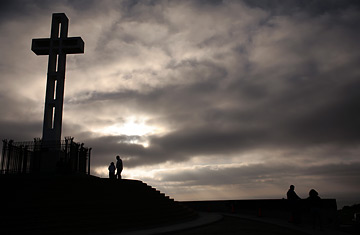
A 43-ft cross stands at the Mt. Soledad Veterans Memorial in San Diego.
(4 of 8)
It was not an easy faith to define or defend, and the early church, struggling to rid itself of heresy, turned to an intellectual weapon already forged and near at hand: the metaphysical language of Greece. The alliance of Biblical faith and Hellenic reason culminated in the Middle Ages. Although they acknowledged that God was ultimately unknowable, the medieval scholastics devoted page after learned page of their summas to discussions of the divine attributes—his omnipotence, immutability, perfection, eternity. Although infinitely above men, God was seen as the apex of a great pyramid of being that extended downward to the tiniest stone, the ultimate ruler of an ordered cosmos cooperatively governed by Christian church and Christian state.
Undermining Faith.
Christians are sometimes inclined to look back nostalgically at the medieval world as the great age of faith. In his book, The Death of God, Gabriel Vahanian of Syracuse University suggests that actually it was the beginning of the divine demise. Christianity, by imposing its faith on the art, politics and even economics of a culture, unconsciously made God part of that culture—and when the world changed, belief in this God was undermined. Now "God has disappeared because of the image of him that the church used for many, many ages," says Dominican Theologian Edward Schillebeeckx.
At its worst, the image that the church gave of God was that of a wonder worker who explained the world's mysteries and seemed to have somewhat more interest in punishing men than rewarding them. Life was a vale of tears, said the church; men were urged to shun the pleasure of life if they would serve God, and to avoid any false step or suffer everlasting punishment in hell. It did little to establish the credibility of this "God" that medieval theologians categorized his qualities as confidently as they spelled out different kinds of sin, and that churchmen spoke about him as if they had just finished having lunch with him.
The Secular Rebellion.
The rebellion against this God of faith is best summed up by the word secularization. In The Secular City, Harvey Cox of the Harvard Divinity School defines the term as "the loosing of the world from religious and quasi-religious understandings of itself, the dispelling of all closed world views, the breaking of all supernatural myths and sacred symbols." Slowly but surely, it dawned on men that they did not need God to explain, govern or justify certain areas of life.
The development of capitalism, for example, freed economics from church control and made it subject only to marketplace supply and demand. Political theorists of the Enlightenment proved that law and government were not institutions handed down from on high, but things that men had created themselves. The 18th century deists argued that man as a rational animal was capable of developing an ethical system that made as much sense as one based on revelation. Casting a cold eye on the complacency of Christianity before such evils as slavery, poverty and the factory system, such 19th century atheists as Karl Marx and Pierre Joseph Proudhon declared that the churches and their God would have to go if ever man was to be free to shape and improve his destiny.
But the most important agent in the secularizing process was science. The Copernican revolution was a shattering blow to faith in a Bible that assumed the sun went round the earth and could be stopped in its tracks by divine intervention, as Joshua claimed. And while many of the pioneers of modern science —Newton and Descartes, for example —were devout men, they assiduously explained much of nature that previously seemed godly mysteries. Others saw no need for such reverential lip service. When he was asked by Napoleon why there was no mention of God in his new book about the stars, the French astronomer Laplace coolly answered: "I had no need of the hypothesis." Neither did Charles Darwin, in uncovering the evidence of evolution.
